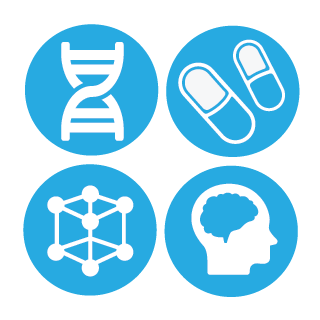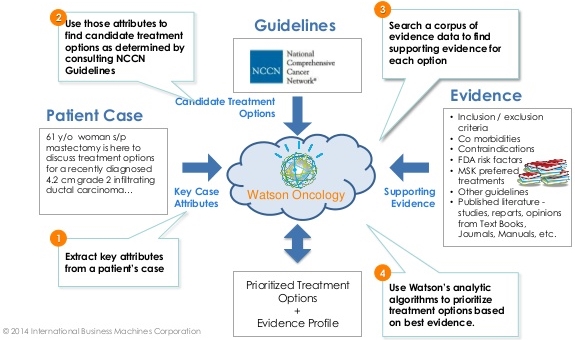Machine Learning Accelerates Cancer Research, Discovery and Innovation
Kailesh Gopalbhai
Digital Health Innovation and Strategy Partner
Cognitive technologies include machine learning, computer vision, speech recognition, natural language processing and robotics1. Machine learning refers to algorithms that improve their performance from data without relying on programmed instructions. Conventional computers perform specific tasks with data, while machine learning operates by creating a model based on inputs and using that to make predictions or decisions.
In oncology, the volume, velocity and variety of the health data exceeds human cognitive capacity. For machine learning, big data instead increases its performance. Here, we review three machine learning applications that accelerate cancer research, predict new drug targets and guide oncologists on the best cancer treatment plans for individual patients.
Medical Literature Review
Meta
A scientific knowledge network powered by machine intelligence.
How Meta’s Literature Discovery Engine Works
Source: Vimeo channel for Meta
Each year, over 100,000 cancer research articles expand scientific knowledge and novel insights. Yet, researchers face information overload with the 200 fold increase in the amount of medical data and facts by 20202.
Meta’s mission is to organize and deliver the world’s technical information. Meta’s platform enables researchers and innovative industries to solve their science and information challenges using a scientific knowledge graph powered by machine intelligence. It identifies emerging scientific and technical advances, at a speed, scale and comprehensiveness that far surpasses human capacity, years ahead.
Examples of predictive services available through Meta include:
Entity Horizon Scanning: Detects novel terms that are emerging in the literature and predicts their future importance based on properties like prominence, diversity, maturity, entropy and geospatial attributes.
Technology and Product Emergence: Detects emerging technologies and identifies products and research tools that are rising in prominence.
Concept Profile: Explores the history of a scientific concept through the literature to identify current trends, new relationships, and future applications.
Concept Emergence: Identifies emerging concepts such as diseases, genes, proteins and viruses, as well as techniques and major areas of research.
Cancer Drug Target Identification
IBM Watson for Drug Discovery
IBM Watson is a cognitive computing system developed by IBM that specializes in understanding the meaning of questions posed in natural human language and that draws on a broad domain of knowledge to respond quickly.
How IBM Watson learns
Source: YouTube channel for IBM Watson
Research, discovery and innovation are the cornerstone of high technology industries and organizations. Today, it takes ten to fifteen years and up to $2.6 billion to bring a new drug therapy to market. In the pharmaceutical industry, the current drug development processes limit exploration of new areas as manual data curation and review, costly investment and time-consuming clinical trials are necessary to validate a drug discovery. Current search technologies typically find many relevant documents, but they do not extract and organize the information content of these documents or suggest new scientific hypotheses based on this organized content.
IBM Watson for Drug Discovery is a cloud-based service designed to enhance, scale and accelerate discoveries by research teams. Using Watson’s natural language capabilities, Watson Discovery Advisor can identify medical terms, distinguish concepts and make connections, turning it into a potent tool for drug discovery and development in life sciences.
First, it helps speed up the research process by assisting researchers validate hypotheses spread over millions of documents, leading to more effective and efficient innovation.
Second, it provides an evaluation of new discoveries by understanding the relationships between scientific domains (genes to disease or proteins to compounds) and/or elements within a scientific domain to facilitate innovation.
Third, it clarifies ideas by driving insights on how domain elements are related like drug interaction and disease symptoms – and provide not related evidence, but visualizations that explain trends in the data and offer hypotheses for a researcher’s inquiry.
In a retrospective study3 released by Baylor College of Medicine and IBM, scientists demonstrated a new path for generating scientific questions that may be helpful in the development of new treatments for disease. In a matter of weeks, biologists and data scientists using the Baylor Knowledge Integration Toolkit (KnIT), based on Watson technology, accurately identified proteins that modify p53, an important tumor suppressor protein with a role in numerous cancer disease models. Watson analyzed 70,000 scientific articles on p53 to identify new protein kinases that phosphorylate and regulate its biological activity. This automated hypothesis generation and discovery based on text mining led the Baylor researchers to identify six potential proteins to target for new research. These results are remarkable since cancer researchers averaged only one similar target protein discovery per year over the last 30 years.
Oncology Clinical Decision Support System
Watson for Oncology
Watson for Oncology examines medical journals, texts, guidelines, and best practices to help oncologists make evidence-based treatment decisions for cancer patients.
Medical information doubles in volume every five years, and oncologists are especially challenged to stay current with medical literature, clinical research, treatment guidelines and best practices. In oncology, systems biology data also advances the precision medicine strategy through a greater understanding of cancer molecular biology and immunology. Patients with brain, breast or lung cancers, melanoma and leukemia are routinely treated with targeted therapies based on their molecular diagnosis results. These advances also raise the complexity of treating individual patients. Each cancer patient produces terabytes of panomic data composed of genomics, transcriptomics, proteomics and metabolomics data. However, the volume, velocity and variety of medical data increase the information overload and burden the human cognitive process capacity. Therefore, a clinical decision support system (CDSS) based on cancer biology require a probabilistic design when the underlying disease models are multiple and the clinical context multidimensional.
Watson for Oncology translates medical data into actionable clinical practice based on a patient’s unique cancer
Source: YouTube channel for IBM Watson
Watson for Oncology uses machine learning to evaluate the clinical factors in individual patient case so as to identify treatment options against those attributes that are relevant to the clinical decision. Watson was trained with cancer patient cases, which, with guidance from Memorial Sloan Kettering oncologists, enabled it to adjust its algorithms and improve the confidence levels associated with the clinical decision options. This cyclical iterative process involves the creation of predictive algorithms and the probabilities of clinical outcomes from treatment choices. Over many cycles, Watson for Oncology recognizes, learns and improves its accuracy with new knowledge. This process prioritizes treatment options for individual patients and provides links to relevant clinical evidence to help oncologists make informed and evidence-based decisions, about which treatments benefit their patients.
Watson for Oncology – assessment and advice cycle4
The power of the technology is in its ability to take the information about a specific patient and match it to a huge knowledge base and history of treatment for similar patients. This process help medical professionals gain important insights so that they can make more-informed decisions, evidence-based decisions, about which treatment to follow.
While originally focused on breast and lung cancers, Watson for Oncology has expanded to more than a dozen other common solid and blood cancers such as colon, prostate, bladder, ovarian, cervical, pancreas, kidney, liver, and uterine, as well as melanomas and lymphomas5.
Conclusion
In the era of cognitive technologies, this symbiosis between humans and technological innovation will produce better results and help us overcome our limitations and be smarter. Together, we will find insights from big data sets to handle complex situations, make more accurate predictions, better anticipate the unintended consequences of our actions and make more informed decisions. This partnership with cognitive technologies is simply the latest evolution in the human journey.


